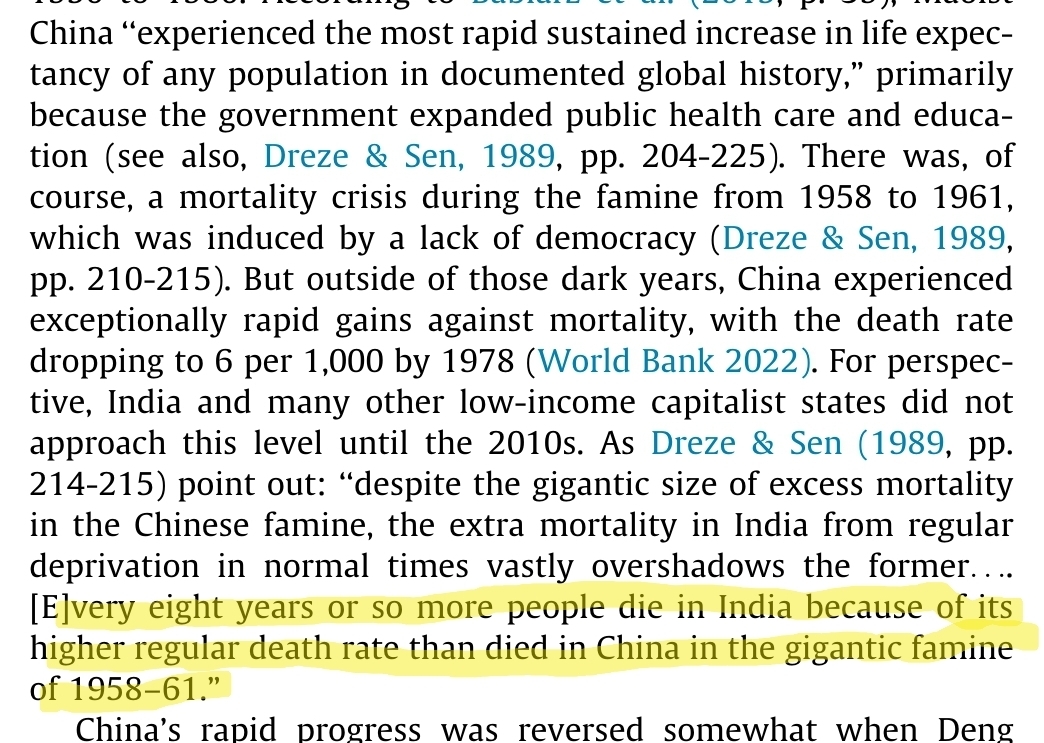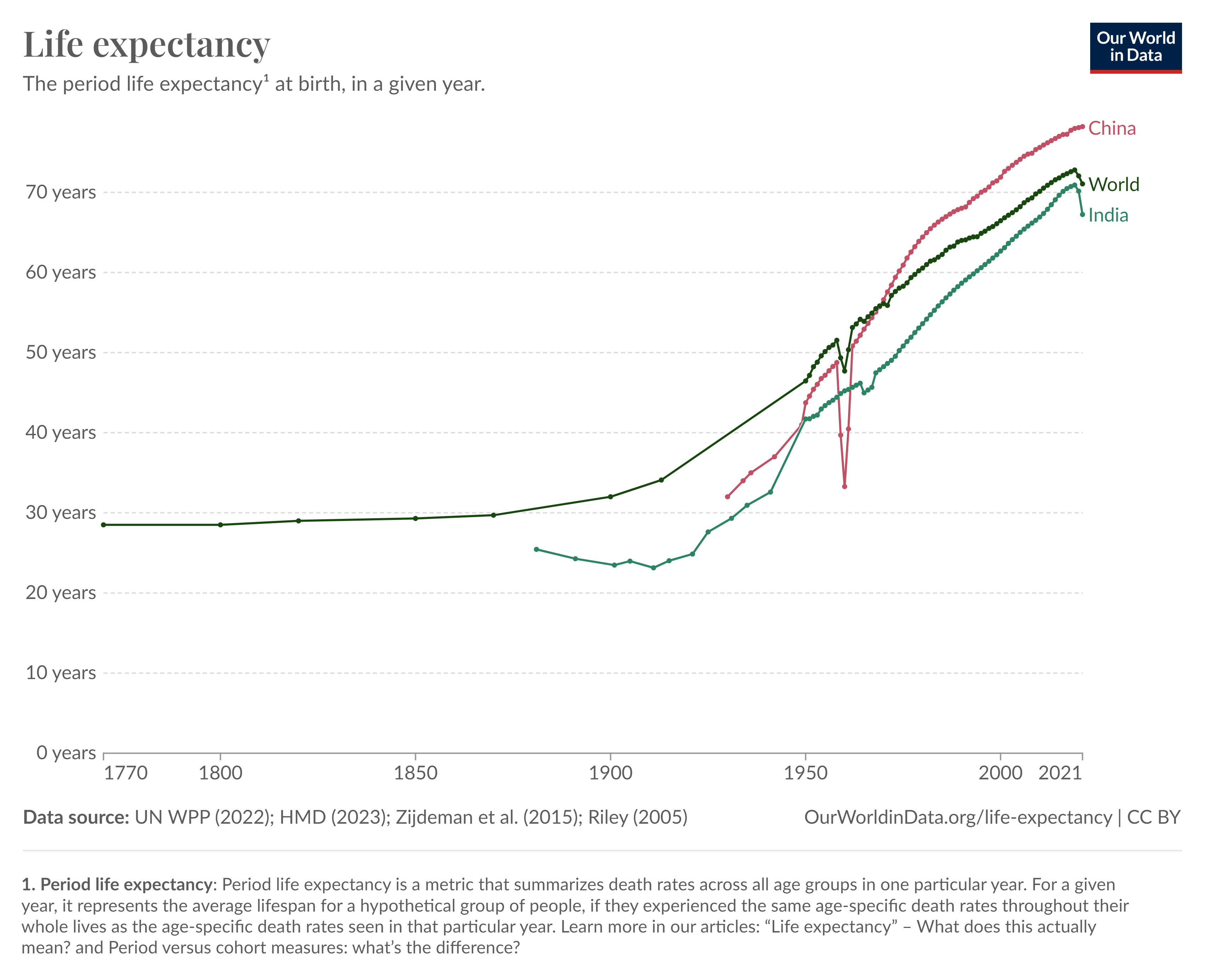A reminder of the unparalleled advances in public health made by communist states. Even if every absurd fabrication that the anti-communist propagandists like to parrot about the millions supposedly killed by Stalin, Mao, etc. was true, those numbers would pale in comparison to the number of lives they saved, the hundreds of millions of life spans extended by entire decades. And if you want the perfect control sample of what it looks like when you start with nearly identical conditions but don’t have communist central planning, look at India.
I think people can really underestimate exactly how big a deal is to bring people out of poverty, this is just such a stunning and powerful point that really puts into perspective how differently we view the tragedy of The Great Leap Forward famine in comparison to the tragedy of people remaining extremely poor and just dying from lack of health care.
a mortality crisis during the famine from 1958 to 1961, which was induced by a lack of democracy
How exactly is a famine induced by a lack of democracy?
People voted to not starve and evil Mao said no.
They are comparing post-independence India and China. They say that while China has done better than India in most cases, China has had a major famine while India has had none. This is the part that talks about democracy:
On the other hand, given the political system of post-independence India, it is extremely hard for any government in office—whether at the state level or at the centre—to get away with neglecting prompt and extensive anti-famine measures at the first signs of a famine. And these signs are themselves more easily transmitted given India’s relatively free media and newspapers, and the active and investigative role that journalists as well as opposition politicians can and do play in this field. The adversarial participation of newspapers and opposition leaders is, as we have discussed earlier, an important part of the Indian famine prevention system. It yields a rapid triggering mechanism and encourages preparedness for entitlement protection.
The contrast with China is striking primarily in the second respect. Given its system of public distribution, China did not lack a delivery and redistribution mechanism to deal with food shortages as the famine threatened in 1958 and later. Despite the size of the decline of food output and the loss of entitlement of large sections of the population, China could have done a much better job of protecting the vulnerable by sharing the shortage in a bearable way.
What was lacking when the famine threatened China was a political system of adversarial journalism and opposition.[31] The Chinese famine raged on for three years without it being even admitted in public that such a thing was occurring, and without there being an adequate policy response to the threat. Not only was the world ignorant of the terrible state of affairs in China, even the population itself did not know about the extent of the national calamity and the extensive nature of the problems being faced in different parts of the country.
Seems to me they have no idea how China is or was actually run and they just assumed it to be this hyper-centralized top-down system when that could not be further from the truth - local governments and communal councils have far more power over the day to day affairs of a community than the central government does, and in the Mao era this was even more the case simply due to the logistical limitations of the time. The majority of the local party officials in any given locality were and are people from that very same locality.
Leaving that aside i like how their argument is purely theoretical, as in there is zero actual evidence given to support it. In fact we have ample evidence to the contrary, of people dying constantly and in great numbers of malnutrition and preventable diseases caused by living in complete squalor and poverty in so-called “democratic” countries with “free and adversarial media” all across the “third world”. It turns out that when the people dying are the permanent underclass, and so long as the affluent are still doing fine, nobody actually pays attention, including the vaunted free media. And neither are the people living and dying in those conditions able to vote their way out of their misery because that would take changing the entire system.
So which country is actually more democratic? The one where you can’t actually change anything substantial no matter how you vote and where no matter how much you exercise your “free speech” nothing ever changes because the ruling class doesn’t give a shit about you, and the same moneyed interests that the government actually works for also control the media? Or a country where massive and unprecedented changes in human history have occurred in less than the span of one human life and where the government is vastly more responsive to the needs, concerns and frustrations of its people than any “liberal democracy”?
The reason why they can say “India has had no major famine” is because India has been in a state of constant semi-famine for a certain class of people and for certain regions. When poor rural communities and slums are in a state of permanent poverty and as a result have much higher rates of malnutrition and much lower life expectancy they don’t call that a famine, that’s just “the default”, that’s just normal. In China it was noticeable because they made sure that it would not be their normal going forward. It’s easy to not have famines when you don’t call them famines, when a part of the population is still well off and you can pretend that everything is fine even while millions live and die in absolute poverty.
So yeah, the idea that “adversarial democracy” and “free media” prevent famines is nice in theory, that’s how you’d expect these systems to work if you have been sold on liberalism. It’s the idea that these systems are the checks and balances on bad actors, and they ensure that bad policies are automatically corrected. This is exactly like believing that the free market just magically regulates itself to achieve the optimal outcome for society. Sadly, observed reality doesn’t conform to that idealized fairy tale.
which country is actually more democratic?
As yogthos once said for these people democracy is a procedural thing. Whether how closely the outcome approximates the will of the people is inconsequential. It is all about multi party elections and ballots.
India is below DPRK in Global Hunger Index. DPRK for context is the most besieged country in the world with a geography that is inhospitable to agriculture. Malnutrition in India is such a problem that it has its own wikipedia article and the government has stopped publishing the stats for it (democracy moment). I walk around where I live and I see so many stunted adults and children. It’s really sad. China on the other hand is one of the most well fed countries in the world, which is crazy considering their size and their non-colonizer origins.
MLs so criticial of CR should really visit India to see a timeline without it.
the maoist uprising against the landlords was the largest and most comprehensive proletarian revolution in history, and led to almost totally-equal redistribution of land among the peasantry
The craziest thing is that him and the Community Party did this while killing 500 bajillion people at the same time.
Stalin killed every Soviet citizen and then resurrected them all again just so he could win WWII
so what happened was he killed off all the weak people and only the super strong people lived and they lived so much longer that in the end it skewed the data
:iamverysmart:
Communism has a proven consistent track record of working, of improving life expectancy, standards of living, of eradicating illiteracy and of creating gender equality.
Facts don’t care about the feelings of reactionary debate bros: Communism works.
It is exactly because communism works that reactionary forces have spent so much effort undermining and smearing communist movements. If it was the case that “communism fails every time” there would be no need for the CIA, for Radio Free Asia, for McCarthyism, for building enough nukes to blow up the entire world several times over, for supporting fascists around the globe. All the imperialist nations would have to do was to lean back and let communism fail on its own terms.
Unfortunely i have a metaphysical view of things so i cant grasp the concept of development dumb tankie
lean back and let communism fail on its own terms
Meanwhile …
Imagine if the Taiping rebellion happened under the PRC instead the Qing, libs would never, ever, ever shut up about it yet in our reality hardily anyone outside China even knows about it.
And if it is even mentioned, it’s often orientalism festival about the “inherently Chinese lack of respect for life and incredible massacres every tuesday”
Though i also remember quite decent chapter about it in book “Historia Chin” by Witold Rodziński
Pfft! Any country would’ve had that happen! In fact, if they got rid of the communism, life expectancy would’ve increased even more! Just look at the former Soviet countries, I haven’t, but I’m sure they were doing much better after communism!
Didn’t know that the expectancy rate in China was that bad in the 1800s. Medieval peasant levels.
The meme isn’t completely wrong, CPC transformed China.

Chinese call the period from approx. 1850 to 1949 the century of humiliation for many good reasons.
personally i don’t want to live that long… I’m in my 4th decade and if it were my last i wouldn’t be upset about it
But at what cost to the free market?
here’s a study https://pubmed.ncbi.nlm.nih.gov/25495509/
This stat tells me next to nothing without comparing it to the rest of the world
You can also see how COVID was handled by China in that graph
Wish it expanded more
It was so unparalleled, that this increased life expectancy for whole world, truly amazing

Every time the most
 people can’t help but proudly display how they don’t actually understand anything. Shit is incredible lol
people can’t help but proudly display how they don’t actually understand anything. Shit is incredible lolOkay now overlay China’s line on top of that. Better yet, take China out of the global average and then compare. Because China actually is single-handedly responsible for a good portion of that average increase.
My point was that life expectancy generally increased throughout the world while this post makes it seem Mao′s regime did a one of a kind miracle. Here are 3 countries with even more impressive change.

You realize two of those countries are also socialist right?
Also include the declines in life expectancy in Bosnia+Herzogovinia and Albania after the collapse of socialism and reintroduction of capitalism.
First of all, as one noted, Bosnia and Albania were part of Eastern socialist Block, Bahrain got its development through being a gulf oil-based state
Second, in making the more accurate comparison, how the fuck does India screw up more compare to China? You didn’t answer my shit for that. India was left more untouched and preserved, compared to China’s initial ruined state pre-Mao
Also, When did I say it was unparalleled?
Do you put words in people’s mouths, like you put your dick in your mother’s?How the fuck does India screw up more compare to China?
Here is some random analysis if it bothers you that much.
India’s less favorable health profile compared to China is largely attributable to its higher rates of mortality from communicable diseases and maternal and perinatal conditions. Further health gains can be achieved by reducing social inequality, greater investments in human development and health services, and by prevention and control of chronic-disease risks such as hypertension, smoking, obesity, and physical inactivity.
Also, When did I say it was unparalleled?
Reply where I said ″unparalleled″ was against original post and poster′s later comment, no idea how did you conclude I quoted you.
Ok thanks for the response, glad we’re on same terms
spoiler
I can’t take back my unwarranted rudeness, I just felt like you were one of those typical Lemmy libs that come here to do a one liner to ‘own’ us… So I said that impulsively
But it seems I was wrong
Yeah, that really puts it into perspective how amazing it was. China starts out around the start of the green line there (Asia), and ends around the red line (Americas). That’s MASSIVELY ahead of the curve.
















